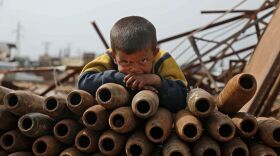
Ruth Sherlock
Ruth Sherlock is an International Correspondent with National Public Radio. She's based in Beirut and reports on Syria and other countries around the Middle East. She was previously the United States Editor for the Daily Telegraph, covering the 2016 US election. Before moving to the US in the spring of 2015, she was the Telegraph's Middle East correspondent.
Sherlock reported from almost every revolution and war of the Arab Spring. She lived in Libya for the duration of the conflict, reporting from opposition front lines. In late 2011 she travelled to Syria, going undercover in regime held areas to document the arrest and torture of antigovernment demonstrators. As the war began in earnest, she hired smugglers to cross into rebel held parts of Syria from Turkey and Lebanon. She also developed contacts on the regime side of the conflict, and was given rare access in government held areas.
Her Libya coverage won her the Young Journalist of the Year prize at British Press Awards. In 2014, she was shortlisted at the British Journalism Awards for her investigation into the Syrian regime's continued use of chemical weapons. She has twice been a finalist for the Gaby Rado Award with Amnesty International for reporting with a focus on human rights. With NPR, in 2020, her reporting for the Embedded podcast was shortlisted for the prestigious Livingston Award.
-
Drought and extreme heat that scientists link to climate change are altering the UNESCO-protected marshlands. Iraq's average annual temperatures are increasing at nearly double the rate of Earth's.
-
Lebanese volunteers are trying to save one of the country's favorite beaches and the nesting places it provides for endangered sea turtles after a February oil spill from an oil tanker.
-
The conflict has not only pitted the regime of Syrian President Bashar Assad against a band of rebels, but drawn the U.S., Iran, Russia and Turkey, among others, into a complex proxy war.
-
A decade since the start of Syria's civil war, hundreds of thousands have died, millions have been displaced, and the war still isn't over — although the Syrian regime has the clear upper hand.
-
Mistrust towards China-produced vaccines, general vaccine hesitancy and distribution complications have all been obstacles in getting the vaccine out in some countries.
-
The dismissal of the lead judge investigating last year's massive blast in Beirut is raising fears of political interference to protect the country's leaders. The blast killed dozens of people.
-
Large swaths of the Middle East are covered in snow, sparking joy and wonder in a region that doesn't normally witness white winters.
-
A coronavirus surge is overwhelming hospitals, leading doctors to tell families to care for sick loved ones at home instead. Health workers fear New Year's parties could have led to further spikes.
-
The story of Lebanese migrants on a doomed boat in September highlights the continuing attempts to get across the Mediterranean Sea — where over 1,000 migrants died in 2020.
-
People were still disembarking from the plane carrying the officials when the explosion hit, causing a large crowd to scatter. More than 20 were killed. There has been no claim of responsibility.




